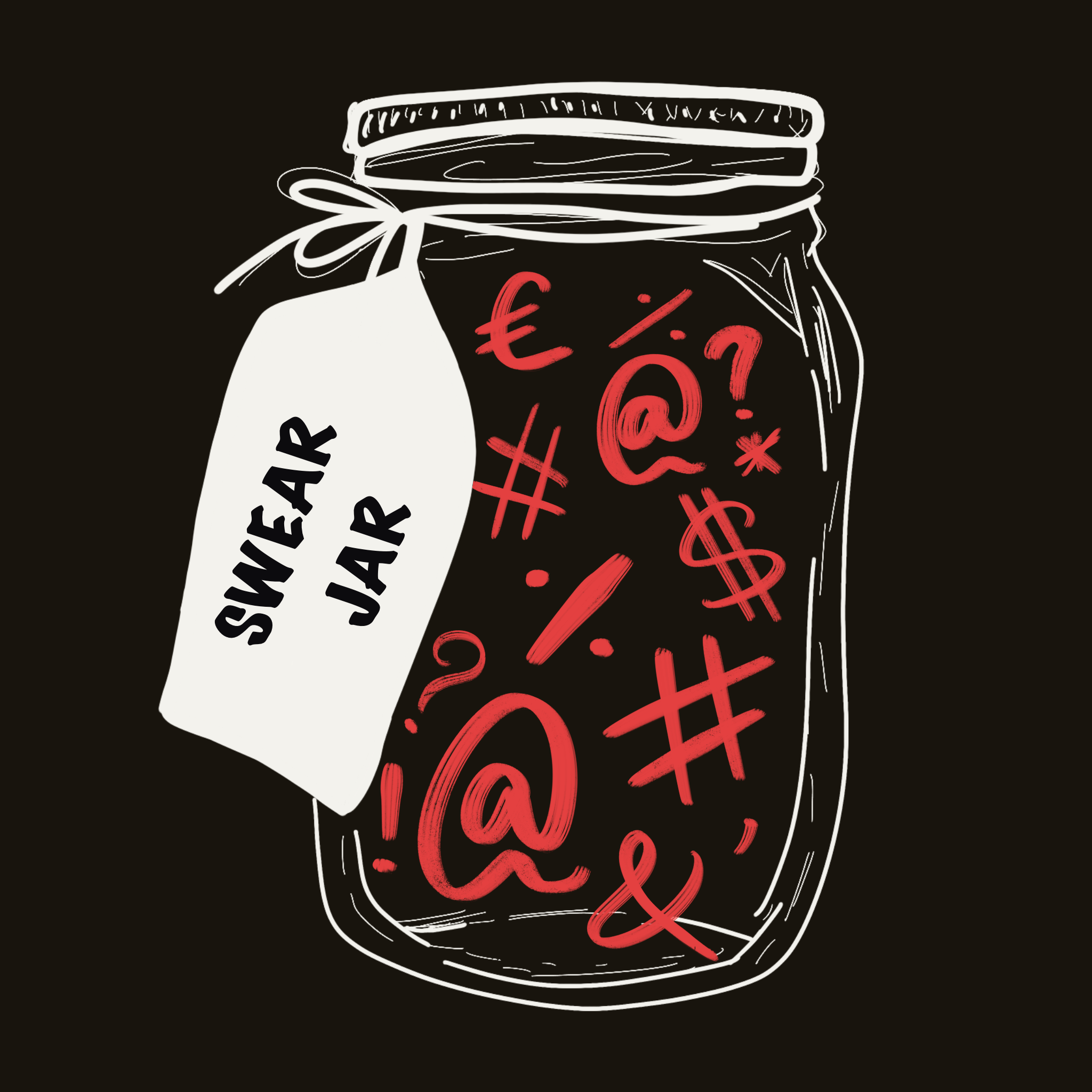
Is there a difference between how native speakers versus non-native speakers of a language process taboo words?
Is there a difference between how native speakers versus non-native speakers of a language process taboo words?

Illustration by Anushka Sabhanam

Illustration by Anushka Sabhanam
Because our psychology program is taught in English, we are constantly speaking English with both native English students, and students whose English is their second or even third language. Only recently, my American friend pointed out how much non-native speakers swear. ‘F*ck’ is barely perceived as a slur by some. Indeed, many second-language English speakers casually use swear words that make natives quiver or cringe. How come native speakers perceive cursing as so much worse than non-native speakers – when the meaning of the words is equally clear to both?
The Neuroscience of Swearing
The neural correlates of the processing of taboo words are still largely unknown. What we do know is that dirty words, abusive words, and slurs are stored separately in the brain from other languages (Finkelstein, 2018). This is supported by the persistence of swear words in severely aphasic patients whose lesions in the frontal lobe lead to lexical dysfunction. For example, Broca’s famous Aphasia patient Leborne was unable to articulate himself – except for the word “tan” and the occasional “Sacre nom de dieu” which means “Holy name of God”. Similarly, Tourette patients who have Coprolalia symptoms display unprovoked production of taboo or swear words (Finkelstein, 2018).
Both these pathologies arise from dysfunction or damage to the (left) frontal lobe, the Broca’s area, or basal ganglia (located underneath the frontal lobe), which are said to disrupt inhibitory processes. Therefore, frontal lobe damage is proposed to increase the use of swearing words or taboo words via decrease in inhibitory function. Similarly, among speakers of the same proficiency, the left frontal lobe is a likely candidate for control and inhibition related to taboo language production (Finkelstein, 2018).
But does that mean second-language speakers who frequently swear lack inhibition? Obviously not. Instead, it has been suggested that the use of a foreign language increases the emotional distance to the words (Costa et al., 2014). Native speakers understand swearing words better in a social-linguistic context than second-language speakers. The coupling of emotion and language has been found to be less efficient and automatic for second-language speakers. Indeed, one study found that taboo words elicit weaker automatic responses in second-language speakers than native speakers, but not in second-language speakers (Harris et al., 2003). These results were interpreted as reflecting that the emotional relevance of taboo words were automatically accessed in native speakers, but not in second-language speakers. Taboo words therefore represent an interface between language and social-pragmatic competence.
A study by Sulpizo et al. (2019) brings more insight into the discrepancy of use and perception of swear words between native and nonnative speakers. Using fMRI, they found that cursing words are processed differently by the brain in second-language speakers than in native english speakers: Participants that were native language speakers processed taboo words more efficiently and with less effort than non-taboo words. Second language speakers, however, processed taboo words with more effort than neutral words, and also engaged additional brain structures such as the anterior cingulate cortex and the insula. Both groups of participants processed taboo words in brain areas known to involve social and emotional processing, i.e. the inferior occipital gyrus, and the anterior cingulate gyrus.These results were again interpreted as reflecting that the social and emotional relevance of taboo words were automatically accessed in native speakers, but not in second-language speakers. These findings contribute to the understanding that lexical processing of taboo words is affected by socio-pragmatic knowledge of these words.
Evidently, some of our frequently swearing students are excused. However, not forever: when language proficiency is high, curse words elicit similar neural responses in second-language speakers as in native speakers (Ferre et al., 2010). Thus, the more we speak and listen to English, the less we should swear! At the same time, it seems plausible that English internet and meme culture contributes to increased use of taboo words of second-language speakers, who are often exposed to proportionally large amounts of content like this. We can also ask ourselves: are we really swearing less since we started our English education? The effects of internet culture of swearing tendencies of second language speakers could be an interesting avenue for future research!
In sum, research into the differential processing of taboo words between native and nonnative speakers demonstrates how the brain processes culturally learned contents. <<
References
– Costa, A., Foucart, A., Hayakawa, S., Aparici, M., Apesteguia, J., Heafner, J., & Keysar, B. (2014). Your Morals Depend on Language. PLoS ONE, 9(4), e94842. https://doi.org/10.1371/journal.pone.0094842
– Ferré, P., García, T., Fraga, I., Sánchez-Casas, R., & Molero, M. (2010). Memory for emotional words in bilinguals: Do words have the same emotional intensity in the first and in the second language? Cognition & Emotion, 24(5), 760–785. https://doi.org/10.1080/02699930902985779
– Finkelstein, S. R. (2018b). Swearing and the brain. The Oxford Handbook of Taboo Words and Language, 107–139. https://doi.org/10.1093/oxfordhb/9780198808190.013.7
– Harris, C. L., Ayçiçegi, A., & Gleason, J. B. (2003). Taboo words and reprimands elicit greater autonomic reactivity in a first language than in a second language. Applied Psycholinguistics, 24(4), 561–579. https://doi.org/10.1017/s0142716403000286
– Sulpizio, S., Toti, M., Del Maschio, N., Costa, A., Fedeli, D., Job, R., & Abutalebi, J. (2019). Are you really cursing? Neural processing of taboo words in native and foreign language. Brain and Language, 194, 84–92. https://doi.org/10.1016/j.bandl.2019.05.003
Because our psychology program is taught in English, we are constantly speaking English with both native English students, and students whose English is their second or even third language. Only recently, my American friend pointed out how much non-native speakers swear. ‘F*ck’ is barely perceived as a slur by some. Indeed, many second-language English speakers casually use swear words that make natives quiver or cringe. How come native speakers perceive cursing as so much worse than non-native speakers – when the meaning of the words is equally clear to both?
The Neuroscience of Swearing
The neural correlates of the processing of taboo words are still largely unknown. What we do know is that dirty words, abusive words, and slurs are stored separately in the brain from other languages (Finkelstein, 2018). This is supported by the persistence of swear words in severely aphasic patients whose lesions in the frontal lobe lead to lexical dysfunction. For example, Broca’s famous Aphasia patient Leborne was unable to articulate himself – except for the word “tan” and the occasional “Sacre nom de dieu” which means “Holy name of God”. Similarly, Tourette patients who have Coprolalia symptoms display unprovoked production of taboo or swear words (Finkelstein, 2018).
Both these pathologies arise from dysfunction or damage to the (left) frontal lobe, the Broca’s area, or basal ganglia (located underneath the frontal lobe), which are said to disrupt inhibitory processes. Therefore, frontal lobe damage is proposed to increase the use of swearing words or taboo words via decrease in inhibitory function. Similarly, among speakers of the same proficiency, the left frontal lobe is a likely candidate for control and inhibition related to taboo language production (Finkelstein, 2018).
But does that mean second-language speakers who frequently swear lack inhibition? Obviously not. Instead, it has been suggested that the use of a foreign language increases the emotional distance to the words (Costa et al., 2014). Native speakers understand swearing words better in a social-linguistic context than second-language speakers. The coupling of emotion and language has been found to be less efficient and automatic for second-language speakers. Indeed, one study found that taboo words elicit weaker automatic responses in second-language speakers than native speakers (Harris et al., 2003). These results were interpreted as reflecting that the emotional relevance of taboo words were automatically accessed in native speakers, but not in second-language speakers. Taboo words therefore represent an interface between language and social-pragmatic competence.
A study by Sulpizo et al. (2019) brings more insight into the discrepancy of use and perception of swear words between native and nonnative speakers. Using fMRI, they found that cursing words are processed differently by the brain in second-language speakers than in native english speakers: Participants that were native language speakers processed taboo words more efficiently and with less effort than non-taboo words. Second language speakers, however, processed taboo words with more effort than neutral words, and also engaged additional brain structures such as the anterior cingulate cortex and the insula. Both groups of participants processed taboo words in brain areas known to involve social and emotional processing, i.e. the inferior occipital gyrus, and the anterior cingulate gyrus. These results were again interpreted as reflecting that the social and emotional relevance of taboo words were automatically accessed in native speakers, but not in second-language speakers. These findings contribute to the understanding that lexical processing of taboo words is affected by socio-pragmatic knowledge of these words.
Evidently, some of our frequently swearing students are excused. However, not forever: when language proficiency is high, curse words elicit similar neural responses in second-language speakers as in native speakers (Ferre et al., 2010). Thus, the more we speak and listen to English, the less we should swear! At the same time, it seems plausible that English internet and meme culture contributes to increased use of taboo words of second-language speakers, who are often exposed to proportionally large amounts of content like this. We can also ask ourselves: are we really swearing less since we started our English education? The effects of internet culture of swearing tendencies of second language speakers could be an interesting avenue for future research!
In sum, research into the differential processing of taboo words between native and nonnative speakers demonstrates how the brain processes culturally learned contents.



